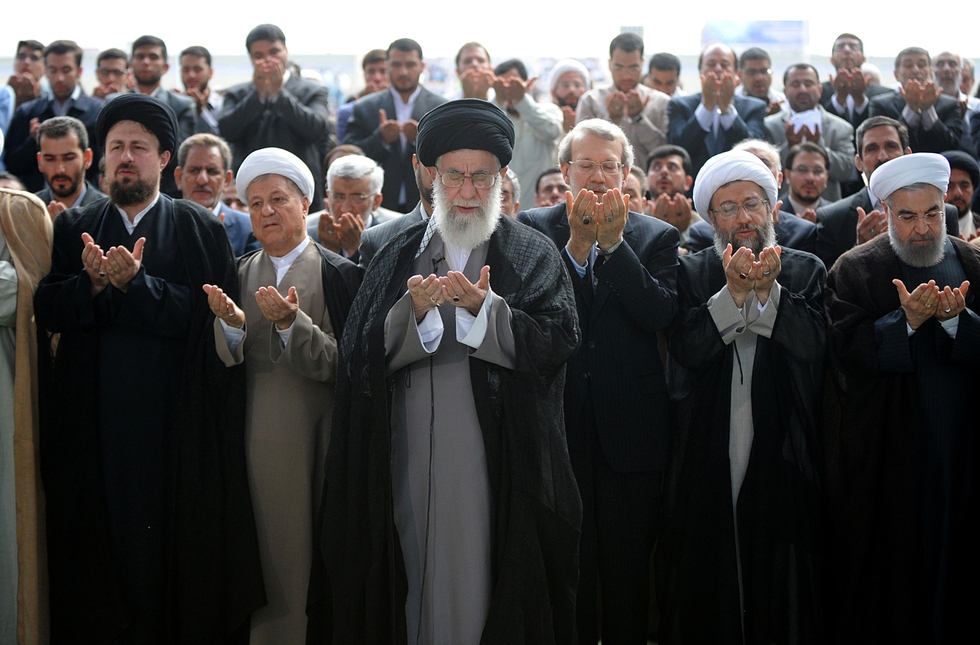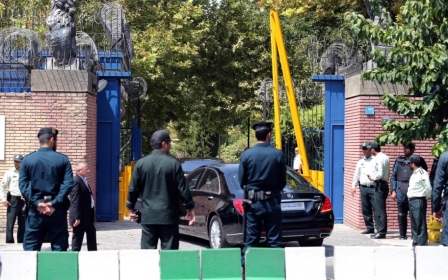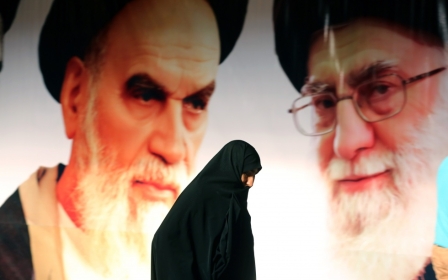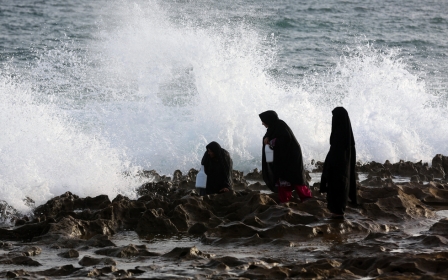Naysayers miss the point: Khamenei supports nuclear deal

On 17 August, in yet another fiery speech, Iran’s Supreme Leader ripped into the United States. “If we want to make a case for [who this enemy is], it would be the United States of America regime, [which] is the manifestation of the domination order par excellence,” Ayatollah Ali Khamenei remarked.
Khamenei’s approach towards the US is, of course, familiar. What made this speech worthy of note was its timing. Two days before the speech, Kayhan’s daily editor-in-chief, Hossein Shariatmadari, in an editorial headlined “The Sole Option Ahead,” wrote that the Supreme Leader is “fully aware of the deal’s inadequacies and its disastrous consequences”. Therefore, he added, “it can be said with certainty that he is not happy with the existing draft of the deal, at all”.
Many observers consider Shariatmadari as Khamenei’s representative in the influential Kayhan newspaper, his mouthpiece, and his informal spokesman.
The office of the Supreme Leader did not deny Shariatmadari’s 15 August claims. Additionally, Khamenei referred to the nuclear deal as a deal whose “fate and its endorsement or rejection is neither clear here nor in America”.
Can the association between the editorial and the speech be seen as the launch of a plan to scuttle the nuclear deal?
Despite the precedent of the Supreme Leader’s office to issue denials, in this case, the most prudent position for the Leader to take is an ambiguous one - if he is in agreement with the deal, given how the agreement is now at the heart of a fierce battle between the two camps of the moderates, led by President Hassan Rouhani, and the hardliners (conservatives).
The Supreme Leader’s open support would humiliate and damage the confidence that the conservatives - the true supporters of the revolution and the nezam (establishment) - have in Khamenei.
Were Ayatollah Khamenei to stand against the deal, he would neither allow the Iranian negotiating team to sign the agreement nor support and praise them throughout the talks.
In statements that appeared on the Islamic Republic of Iran Broadcasting (IRIB) website on 1 August - but which disappeared several hours later - Abbas Araghchi, Iran’s senior negotiator, said: “How is that possible he [Khamenei] takes an indifferent stance if the red-lines were crossed? He would have certainly reacted.”
Ali Akbar Nategh-Nouri, the present head of the Inspection Office of the Supreme Leader, once remarked that the Ministry of Foreign Affairs would report “every single minute detail” of the talks to Khamenei.
Additionally, the idea that Shariatmadari is the informal spokesman of the Supreme Leader is flawed. Western observers give too much credit to Shariatmadari. Ayatollah Khamenei has overruled his views in some of the most fundamental cases.
For example, Shariatmadari considered as a permanent redline any talks with Americans.
“Talking to America,” he once stated, “is [tantamount to] shaking hands with the devil and dancing with the wolves.”
He argued that Iran’s resistance to the US has made it the role model for all freedom fighters in the Islamic world. “America’s intention is to break this model apart by talking to Iran. … They want to give this impression to the movements in the Islamic world that the Islamic of Republic of Iran, your strategic and ideological ally … [after long years of resistance] had finally no choice other than to sit beside America and talk to America.”
Khamenei put forth the doctrine of “heroic flexibility,” and lengthy, diplomatic talks were then realised between Iran and America.
But why is it that when Iran’s leader talks about the nuclear deal, he consistently attacks the United States and Israel?
Khamenei’s chief goal is to convey the message that Iran is not accepting the deal from a position of weakness. This message may target two groups.
The first group consists of the hardliners and Israeli supporters in the US establishment, mainly in Congress, who argue that the US is capable of forcing Iran into more concessions by exerting more pressure on them. Khamenei’s fierce attacks seek to discredit this vision.
The other group that Khamenei’s anti-American statements are aimed at is the radicals who view the negotiations and compromise with America as the beginning of the erosion of the anti-arrogant (a term used in Iran interchangeably with anti-imperialist) characteristic of the revolution. Because they loyally support him, Ayatollah Khamenei heavily considers their views in the positions that he takes.
But in his 17 August speech, the Supreme Leader brought up another issue to address the biggest concern for the conservatives: relations with the US may be restored once the deal is finalised.
Conservatives fear that Americans will aggressively enter the Iranian market, sideline all other industrial countries and thus become the dominant actor in the Iranian market, giving rise to pro-American white-collar workers and technocrats. This development could lead to US influence within Iran and threaten the authority of the religious establishment.
A recent rumor about McDonald’s - a symbol of US pop culture - opening branches in Iran, added to the conservatives’ anxiety. American pop culture, according to Joseph Nye, Harvard professor and inventor of the term “soft power,” is an important element of America’s soft power.
Mohammad Mohammadi Golpayegani, the Supreme Leader's Chief of Staff and an influential cleric, remarked on 21 August: “Today, the threat is about influence. [The] enemy, with a polite and pleasant appearance, seeks to gain influence in any possible way. … They [want to] send their economic institutions such as McDonald’s [to Iran] to promote the corrupt American culture.”
To address the issue of influence, Khamenei said that the US intends to take advantage of the nuclear agreement to gain influence in Iran.
“But we have decisively closed this path. We would allow neither Americans’ presence in Iran, nor their economic influence, nor political influence, nor cultural influence,” he remarked.
Regarding the fate of the agreement, as far as Iran is concerned there are indications that the agreement may not be sent to Majlis (Iran’s parliament), although 201 of the 290 members of parliament have signed a letter demanding the government submit the agreement to them for approval.
The Supreme National Security Council (SNSC) is working on the agreement in cooperation with a parliamentary commission. If it is approved by the SNSC and endorsed by the Supreme Leader, according to article 176 of the Iranian constitution it becomes like a law. There is no need to get parliament’s approval. Even if the case is taken to parliament, it is unlikely to be rejected, considering the sensitivity of the issue.
Is it possible that Ayatollah Khamenei would suddenly oppose the deal?
If, due to some developments in the US, the finalisation of the agreement becomes questionable, it is likely that Khamenei in a preemptive action will oppose the deal. Familiarity with the intricacies of the mindset of the Iranian leadership reveals that Israel’s intense objection to the deal - as well as their supporters in the US Congress - have most likely convinced them that the deal is in the Islamic Republic’s interests
Among clerics there is a highly regarded principle with a practical value attached to it: “Things become distinguished through their opposites.” On that basis, and from their perspective also, if Israel and its supporters are against the deal, then the agreement is, again, in the interest of the Islamic Republic.
- Shahir Shahidsaless is a political analyst and freelance journalist writing primarily about Iranian domestic and foreign affairs. He is also the co-author of “Iran and the United States: An Insider’s View on the Failed Past and the Road to Peace,” published in May 2014.
The views expressed in this article belong to the author and do not necessarily reflect the editorial policy of Middle East Eye.
Photo: Khamenei leading Eid prayers 18 July, 2015 (AFP)
Middle East Eye propose une couverture et une analyse indépendantes et incomparables du Moyen-Orient, de l’Afrique du Nord et d’autres régions du monde. Pour en savoir plus sur la reprise de ce contenu et les frais qui s’appliquent, veuillez remplir ce formulaire [en anglais]. Pour en savoir plus sur MEE, cliquez ici [en anglais].





